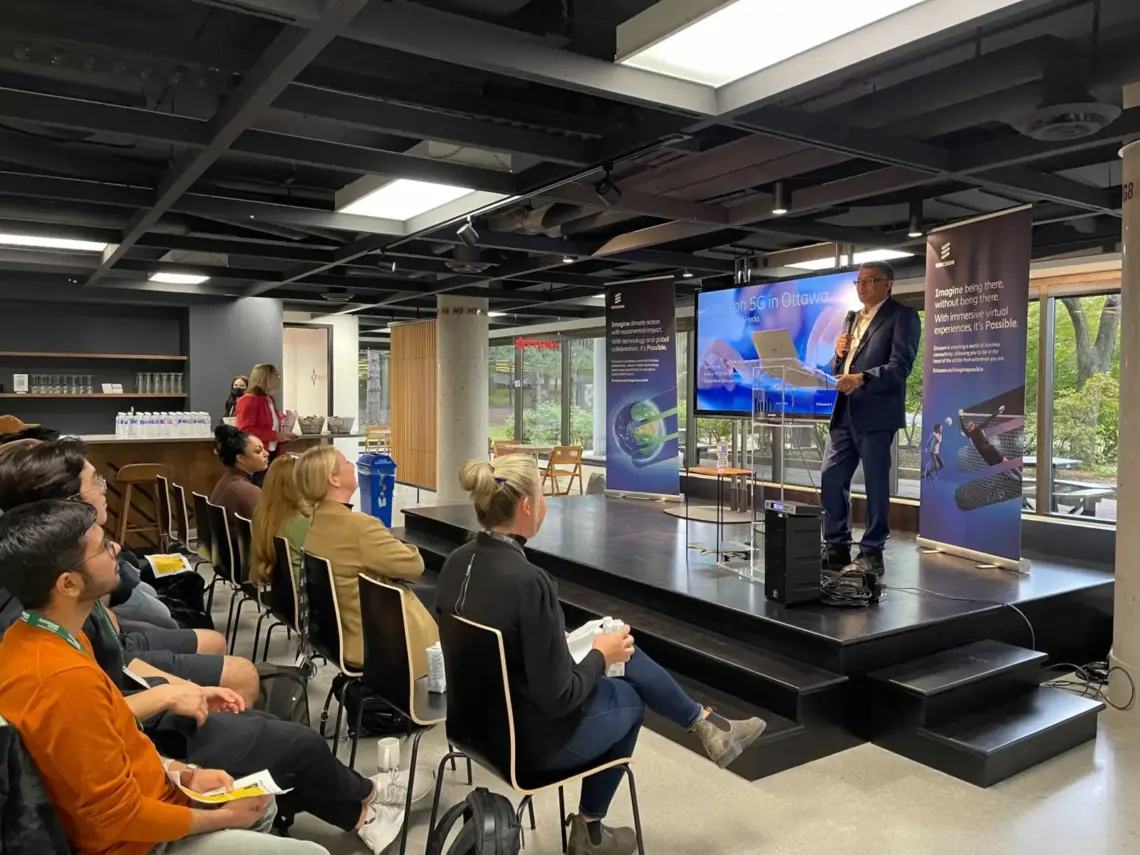
A battle of out-of-the-box thinking was celebrated recently in Canada’s largest technology park.
After three weeks of pushing themselves to solve a real-world sustainability problem by leveraging the power of 5G, teams submitted their solutions via video in Kanata North Business Association’s first-ever Hackathon. Short-listed teams were invited to present in front of an audience.
The victors were Carleton students Aria Zhang, Yan Tang, Jenny Hu and Ryan Wang, who formed the confidently and aptly named “The Winning Team.”
The hackathon launched on Sept. 28, when students were given this challenge:
Do you want to help Kanata North be the green high-tech capital of Canada? People and companies do not realize the amount of water and electricity they use day-to-day. Most of the time, we rely on people to monitor their usage! This leads to an incredible amount of waste, which is costly for companies and harmful to the environment. We have seen the impacts of climate change, like the several natural events that have occurred in our city over the last several years. We want YOU to help us develop a solution to water and electricity waste using 5G, IoT, etc.!
In their proposal to judges, The Winning Team proposed a solution that would use solar panels linked to a 5G network that would be more reliable and provide real-time data on output. Sensors inside the panel would be connected to the building’s 5G network.
The three main benefits of this solution are
- Controlling electricity usage to maximize non-urgent power needs (running a dishwasher when there is abundant solar power, for example.)
- Using 5G, use the fluctuating energy price using the solar intensity (Imagine companies encouraging companies to charge their cars at the time of day when sunlight is strongest)
- Selling excess energy back to the market when there is the best price (Using 5G to calculate when there is the best price and the most up-to-date data)
- Using 5G network allows users to stay updated on the state of solar panels, and maintain them before problems arise. (After being alerted there is an issue with the panel, drones can be sent to do work on the panels like removing snow)
Their prize: $2,000, donated by Ross Video.
Second place winners Hello World won $1,000, donated by L-Spark, and third place winners Eric & Sons (a nice play on presenting sponsor Ericsson’s name) won $500, donated by Nokia.
 Nearly 100 students took part in the hackathon, and Erin Moretto, KNBA’s director of programs and Hub350 operations, said the event will become an annual tradition.
Nearly 100 students took part in the hackathon, and Erin Moretto, KNBA’s director of programs and Hub350 operations, said the event will become an annual tradition.
“This was such a great event, and it’s thanks to our sponsors who supported our first Hackathon with outstanding mentorship and judging. This was such a great opportunity for students to get to know Kanata North, and the people and companies in our tech park,” Moretto said.
In addition to prizes, judging and mentorship, the tech park supported the event in tasty ways. Nokia sponsored the ‘after party’ on the event’s concluding night, Solace provided swag bags for students, Pleora provided fuel (“tons of snacks!” Moretto said) and JoJo’s Pizza provided food for hungry hackers on nights one and two.
Moretto said the Hackathon brought together the students and more than 20 tech mentors to solve the problem. It is part of the tech park’s close relationship with Ottawa-area postsecondary institutions, she added.
